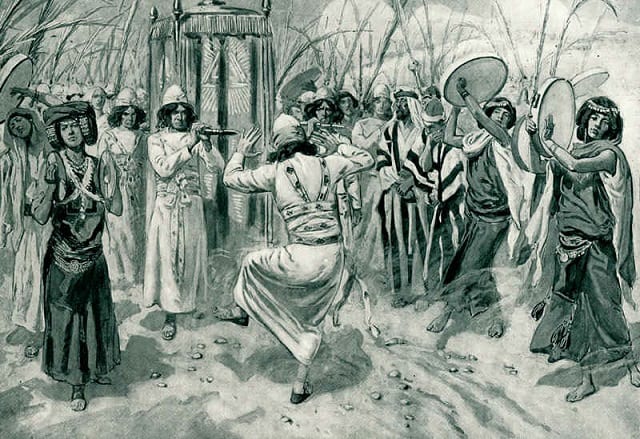
The following came about on the Coming Home Network board, which I moderated from 2007-2010, as a result of my answering queries. The first instance (where someone asked about the propriety of attending Stravinsky’s ballet, The Rite of Spring) was private, but the second public, so I can ethically include the other person’s arguments there (two other people’s comments will be in blue and green).
* * * * *
The Rite of Spring is fabulous. It’s one of my favorite pieces of music. I once read through the entire score while listening to it.
The question here is whether watching a ballet that is devoted to pagan themes amounts to an espousal and moral approval of those same themes in their entirety. Clearly, I think, it is not. Enjoying a dramatic or dance presentation of something may involve many many different themes. It doesn’t follow that we agree in principle with everything we watch: everything that is portrayed.
Indeed, classic drama, as passed down from the Greeks, involves a protagonist and antagonist (good vs. bad guys). We don’t agree with the antagonist, by definition. But we can enjoy the dramatic portrayal of a bad person (e.g., the masterful acting performance of Anthony Hopkins in The Silence of the Lambs).
That would apply to The Rite of Spring. The only applicable question I think, with regard to ethics and morals, would be if you have reason to suspect (as you alluded) that there will be lewd behavior or nudity that might cause you to stumble. Nudity is a whole other issue (portrayal of sexual acts is quite another, and clearly objectionable), but the main question is your response to the ballet: would it cause you problems (which you would base on similar experiences in your past)? You might want to inquire, if possible, exactly how they will perform the ballet and then make up your mind accordingly.
But based on the theme alone of something, I don’t think it is immoral at all: to watch it.
I think it’s impossible and unrealistic, if one enjoys art and music at all, to always expect to agree 100% with the worldview of the artist. Enjoying some work of art isn’t the same as giving approval to absolutely everything. We can try to weed out the more hostile or skeptical artistic works, of course.
If we don’t enjoy art that has some elements contrary to our opinions, we’ll find ourselves hardly enjoying art at all. It is one or the other. There have been Christian groups who shunned art entirely as idolatrous and pagan (e.g., the Puritans). That is the logical reduction of the reasoning that it if it isn’t morally perfect then we can have nothing to do with it.
I think it is a subjective judgment, so I can’t really give an absolute answer.
[he asked about displaying The Kiss, a painting by Gustav Klimt, with children around]
Again, it is a subjective judgment. If you think it is tastefully done, I see no harm to children at all. In fact, I think they are more harmed by a mentality that conveys the impression that sex is “dirty” and something to be ashamed about.
* * *
Yesterday I was reading some stuff by St. John Vianney, and he seemed to talk about dancing as if it was from the pit of hell. Given the fully dressed, conservative dancing that I would expect from his time period, I can’t imagine what he would think about dancing today. Should I be concerned about this? I ballroom dance and occasionally break dance. It makes me a bit uncomfortable that such a holy saint condemned dancing in such a way.
Dancing, like lust or hatred, is a thing whose morality is determined largely by inward feelings and will. Some motions, etc. might be considered too sexually suggestive. I trust that most Christians know where to draw that line. Clothing worn is another issue.
One can’t get too legalistic about dancing or music or art in general. That is Protestant fundamentalism; not the Catholic view. There is such a thing as a permitted dancing and music in the Bible itself. So how can any Christian be totally against those things?
God expects us to use our heads and conscience and spiritual discernment to know where the lines are drawn in these things, rather than being so legalistic that good things are forbidden. Every good thing can be abused. Not a reason to ditch everything.
Perhaps I am being a little ridiculous here, but may I press the point a bit more? Is it really that easy to dismiss Fr. Vianney’s views here? He was, after all, a saint. Are there other saints whose views might “counter” his? Church teachings? Forgive me if it sounds like I’m just trying to be difficult, I’d just like to get deeper into the question. I would note, however, that the instances of dancing in the Bible are not anything like partner dancing (which, I believe, is what Saint John Vianney meant) as far as I know. If these facts are correct, partner dancing might warrant further consideration. I see your point about not denouncing all art, though. I should also note, that I’m not trying to condemn all dancing either, but I feel that some issues like this are sometimes too quickly dismissed to the fundamentalist category. We are, after all, to test all things.
If we can’t condemn it altogether, then clearly it comes down to individual discretion, discernment, and judgment of where the lines are. Sometimes these things come down to what offends those around us or stumbles them. You don’t drink alcohol in front of an alcoholic, even though it is okay as long as no drunkenness occurs. If someone thinks rock and roll is from the devil, one tends to not play it in their presence. It is charity to work with the weakness and even erroneous opinions of others.
We human beings usually find that sort of serious discerning to be difficult and too much work, and so we clamor for black and white, distinct lines so we don’t have to strain our brains thinking (and this is truly a general observation, not directed to you!). But in things like art and music and dancing it is just too difficult to have hard and fast rules. So it comes down to individuals and contexts.
No saint dictates what is Catholic doctrine on any given thing. Even St. Thomas Aquinas was wrong about the Immaculate Conception. Even St. Augustine was wrong about predestination. During the Great Schism in the 14th century when more than one person claimed to be the pope, there were saints on both sides. Etc. By all means, take what a saint says about something into consideration, and respect and ponder it, but it ain’t the rule of law for a Catholic, especially if two saints contradict each other. What they say may have had a particular social or historical context, too, which applies even to some biblical statements.
Some of the Church fathers were anti-Semitic, and some had extreme views against sexuality, almost as if all sex were a bad thing, which is absurd. The Church didn’t follow that. Those opinions were to a large extent conditioned by the times, and were overreacting to pagan sexuality and Jewish rejection of Christianity.
Thanks Dave, the examples of other saints being wrong puts things in perspective. I’ll keep that in mind next time I stumble across an odd saying by any of them.
* * *
I to this day, refuse to look even a veiled women in the eye. It is a sin to look at a man/women without any good reason.
That’s interesting. So if you go to a supermarket and get up to the checkout line, you look sideways or down? How about if you get a woman optometrist or eye doctor: do you tell them that is a sin and ask for a man? It must be tough going through life without ever looking a woman in the eye when you are talking to them.
I look at the ground when talking to women unless they are within my family. It is not tough, it is gratifying. In this respect, I believe Mohammedanism has it correct, women should cover their faces and the sexes should avoid mingling except for extraordinary occasions.
[this person actually was a Muslim for a while, then returned to the Church]
Modesty has always been, and will always be a governing part of the Church.
Indeed. And extreme legalism will not be.
Would dancing be sinful? I don’t know- your call. I would consider it so.
We can’t make a blanket statement like that, and all you can say is that it is sinful for you, if you think you are so weak spiritually that you will inevitably be caused to internally stumble by dancing. Otherwise, God would be a sinner, because there is clearly a permissible dancing in the Bible. Read 2 Samuel chapter 6, where David danced “before the LORD” (6:14). Michal, Saul’s daughter, didn’t like that. In 6:23 at the end of the chapter it is noted that she had no children her whole life, thus strongly implying that she was judged by God for her judgmental opinion about David dancing.
Psalm 150:4 says that we can praise God with dance.
God Himself encourages dancing, in happiness, of His followers, in Jeremiah 31:4.
That is insulting, to say that I am so weak that dancing would be an occasion of sin for me. It is the atmosphere where one dances. I can hardly believe that going to a night club would not be an occasion of sin for anyone, no matter how virtuous. And I am fairly sure that David did not break dance.
Then be much more careful with your language. You didn’t mention the nightclub environment, where a strong “contextual” case can be made. You simply made a blanket statement. Words mean things. And so I made the sensible response, that you can only say it is sinful (in such a broad way) for yourself, and if it is sinful for you on all occasions then I say you must have a certain weakness to be that easily stumbled. In other words, weakness to that extent exists inside of persons. It isn’t because all dancing is sinful (a question of intrinsic sinfulness). And the first thing to do to overcome our own weaknesses is to acknowledge them, not put the blame on the thing itself or become legalistic about it.
***
(originally 1-2-09)
Photo credit: “David danced before the LORD with all his might; and David was girded with a linen ephod”; 2 Samuel 6:14, by James Tissot (1836-1902) [public domain / Wikimedia Commons]
***













